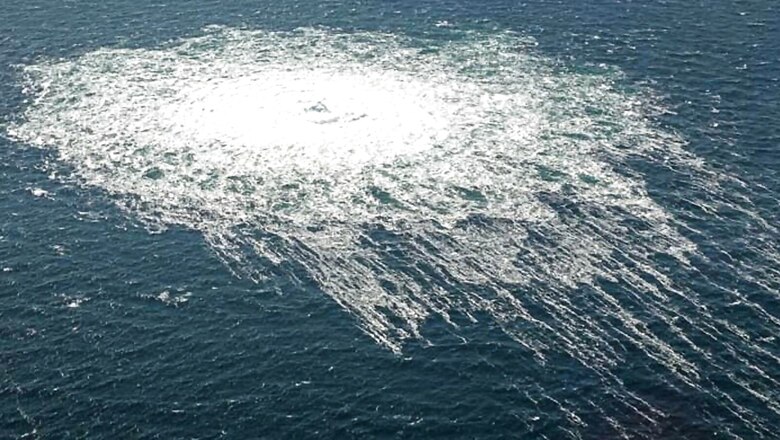
views
Last week, as you were eating your breakfast cereal or sipping your coffee, a couple of mysterious blasts took place hundreds of miles away that may yet again raise the prices of all those things you ate. The damage? Four leaks in the Nord stream pipelines that carry Russian gas to Europe. Catastrophic yes, surprising, No. That said pipelines have been the subject of invidious spy games and international role playing when they began to be laid from the erstwhile Soviet Union to Europe in the 1960s. No much seems to have changed since then. Power still flows from the pipelines and though the politics are terribly complicated at one level, with more than two dozen states involved, it is also extremely simple at another.
Mysterious blasts
First, the incident itself. There are two major pipelines — Nord stream 1 and 2 (with subsidiary lines) and both have been damaged. The explosions were recorded by the seismology stations nearby which observed that at least one of the blasts measured 2.3 on the Richter scale. That’s about the size of the quake that hit Delhi in 2020. In other words, while not in the big league in terms of a quake, it’s certainly large enough to need a considerable amount of explosives. Don’t even think of terrorists. It simply can’t be done by your average jihadi, no matter how motivated or well-armed. “It’s sabotage,” said officials rather less than brilliantly. However, none were able (or willing) to point a finger at which state was involved. Neither pipeline was delivering gas to Europe; Nord stream-1 because Moscow turned off the taps in retaliation for sanctions. Nord stream-2, which just became operational after construction started in 2016, was halted by Germany days before Russia invaded Ukraine.
There are contractual obligations on both sides, and Germany has only provisionally stopped Nord stream-2 completion by holding up the final certification. Russia has been switching the gas on an off, citing technical reasons over the last year. Repairing the pipeline will take time. The bottom line is that as winter approaches, a desperate Europe has to turn to other sources of oil, leading to gas prices already surging 30 percent.
Pesky pipelines
Cheap Russian energy was already alarming US intelligence agencies in the 1950s, a worry that worsened as the then West Germany and Italy began negotiating with Moscow to not just buy cheap oil, but barter this for technology particularly in pipelines. At the time much of the Soviets trade was on barter, with the USSR sorely in need of modern technology. Washington moved swiftly to block such deals, but Germany’s steel producers went ahead and trade rose steadily. Italy, with no reserves of coal at all, became completely dependent on Soviet energy, while the UK remained divided.
Expert studies point to a stream of reports from US think tanks warning of political manoeuvring, and incidentally also of ‘dislocation’ which in effect meant fewer revenues to American, British, Dutch and French international companies. In the 1960s, Washington succeeded in passing a resolution within NATO to embargo exports of large diameter pipes intended for use in the first ambitious Soviet pipeline Druzba (Friendship), with this lifted only in 1966. Other pipelines like Urengoy, pipeline controversially bringing gas to both sides of Germany, agitated the Reagan administration enough to first offer financial incentives against the pipeline, and then applied unprecedented extraterritorial sanctions on components being supplied by European companies, which were of American origin. This created a political crisis of no mean order. Eventually, after severe disputes, the US lifted the sanctions and the Urengoy pipeline(s) went ahead anyway, ironically with more Soviet equipment than originally intended. That was Phase 1 so to speak. In the case of Nord stream-1, it was far worse.
Post the end of the Soviet Union, Moscow was annoyed at the transit fees demanded by countries such as Ukraine in particular that became a primary ‘gateway’ for Russian energy exports. Russia then began to explore the possibility of a direct undersea pipeline to Europe. In this, President Putin was encouraged by Chancellor Schroeder, who understandably, not only appreciated the value of cheap energy, but also the contracts German firms could get in Russia. His championing of the pipeline may have cost him the election, but he then joined the board of directors of the pipeline’s new operating company soon to be named Nord stream. His successor Angela Merkel, not known as the Iron Lady for nothing, went on to push for the Nord stream-2 in 2015 in the face of US Congressional opposition, and the threat of sanctions using a 2017 law that targeted Russian energy projects everywhere. In the end, a compromise was reached, whereby Germany promised to sanction Russia if it used energy as a weapon or attacked Ukraine. When it did, Germany had no choice at all. Who else was objecting to the Nord stream pipeline is interesting. That included both Ukraine under President Zelenskyy and Polish President Andrzej Duda.
Present contretemps
The basic fact that emerges from the explosions is that whoever did it had the technical knowledge of these pipelines, their depth, explosives required, and the methodology to place them there. That last is the real challenge. Nord stream itself puts the probability of pipeline failure or leakage as low as one damage event every 100,000 years. That’s how safe it was. And now this.
Meanwhile, social media blames the US, since there is even a video clip of President Joe Biden saying that in the event of Russian invasion, Nord stream would end, earlier echoed by Undersecretary Victoria Nuland. But Biden has been opposed to driving allies off his side, preventing Congressional sanctions on Nord stream 2. In May, Biden waived sanctions on the Russian-owned, Swiss-based company running the pipeline project, as part of an agreement with Germany. But here’s the bottom line. That Germany would probably relent on the pipeline is apparent from an interesting titbit. In August, former Chancellor Schroeder was in Moscow talking to Putin, and urging the reopening of Nord stream-2. That he would go there in a private capacity seems unlikely. As seen in the past, US pressure could only do so much. The explosions have at least finished off that possibility for the near future. Much can happen in six months, particularly to Putin.
Other suspects
A second possibility that the Ukrainians could have done the dirty deed — but only through guidance and expertise from somewhere else. A third one is that Russia may have scored a deliberate self-goal to break the unity of NATO and made money on it too, as oil prices rise. But considering Moscow has been already cutting or reducing the flow for months, apparently for maintenance (though together with German crews), it rather seems like becoming one’s own hangman; this particularly as winter hits. There is a fourth possibility. Two years ago, a security breach exposed Nord stream employee data. If the culprits were within the company, even if motivated from outside, the truth may never come out.
Already, a ‘hushing up’ is evident, with the media hardly covering the story, and accounts of the earlier spats on the pipeline missing. Oil majors and certain political circles probably know who is at the bottom. It’s a small industry and the gossip is intense. And remember, as in murder mysteries, it’s almost never the butler who did it.
Meanwhile, the fallout is likely to be intense. It’s not just that fuel prices are likely to increase, putting further pressure on countries already reeling from the shock. It’s that what one can explode, another can too. This is war, and the possibility of more such explosions and sabotage in other pipelines remains entirely likely. Relish that breakfast while you can. It just might have gotten prohibitively more expensive to replicate in the coming weeks.
The author is a Distinguished Fellow at the Institute of Peace and Conflict Studies, New Delhi. She tweets @kartha_tara. The views expressed in this article are those of the author and do not represent the stand of this publication.
Read all the Latest Opinion News and Breaking News here




















Comments
0 comment